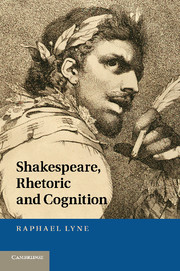Book contents
- Frontmatter
- Contents
- Acknowledgments
- Chapter 1 Introduction: ‘pity, like a naked new-born babe’
- Chapter 2 Metaphor and synecdoche in cognition
- Chapter 3 The drift towards cognition in rhetorical manuals
- Chapter 4 A Midsummer Night’s Dream
- Chapter 5 Cymbeline
- Chapter 6 Othello
- Chapter 7 The Sonnets
- Conclusion
- Notes
- Bibliography
- Index
Chapter 5 - Cymbeline
Published online by Cambridge University Press: 07 September 2011
- Frontmatter
- Contents
- Acknowledgments
- Chapter 1 Introduction: ‘pity, like a naked new-born babe’
- Chapter 2 Metaphor and synecdoche in cognition
- Chapter 3 The drift towards cognition in rhetorical manuals
- Chapter 4 A Midsummer Night’s Dream
- Chapter 5 Cymbeline
- Chapter 6 Othello
- Chapter 7 The Sonnets
- Conclusion
- Notes
- Bibliography
- Index
Summary
In A Midsummer Night’s Dream, the process of rhetorical thinking is most manifest when it fails to solve all the emergent problems smoothly. It requires some resourceful use of catachresis for Bottom to think his way, more or less, out of an epistemological crisis. There is a moment of similar intensity in Cymbeline, when Imogen wakes after a drug-induced sleep (a repeated motif, and perhaps not surprisingly so, given how exposed cognition is, in such a predicament). Like Bottom, she starts out partly unaware of where she is. Like him, she finds herself having to take account of her surroundings and what has been happening. As with him, the rhetorical manoeuvres of her thought do not lead to a correct understanding:
Yes, sir, to Milford-Haven, which is the way?
I thank you. By yond bush? Pray how far thither?
’Od’s pittikins! can it be six mile yet?
I have gone all night. Faith, I’ll lie down and sleep.
[Sees the body of Cloten.]
But soft! no bedfellow! O gods and goddesses!
These flow’rs are like the pleasures of the world;
This bloody man, the care on’t.
(4.2.291–7)
She has been dreaming, it seems, of her journey to find her husband. The man lying near her should not be her bedfellow – Posthumus should – and as we shall see, thoughts of her proper companion infiltrate her attempts at comprehension. Her tool for trying to take in a scene wherein she is strewn with flowers, and there is also a headless man, is a simile. The flowers and the corpse come to resemble and stand for the vicissitudes of life: as such, they take places in a pattern and actually complement one another. The simile is extravagant and strange, and this is characteristic of Imogen, whose first solution to distance, for example, is to wish for a horse with wings (3.2.48).
- Type
- Chapter
- Information
- Shakespeare, Rhetoric and Cognition , pp. 132 - 162Publisher: Cambridge University PressPrint publication year: 2011



